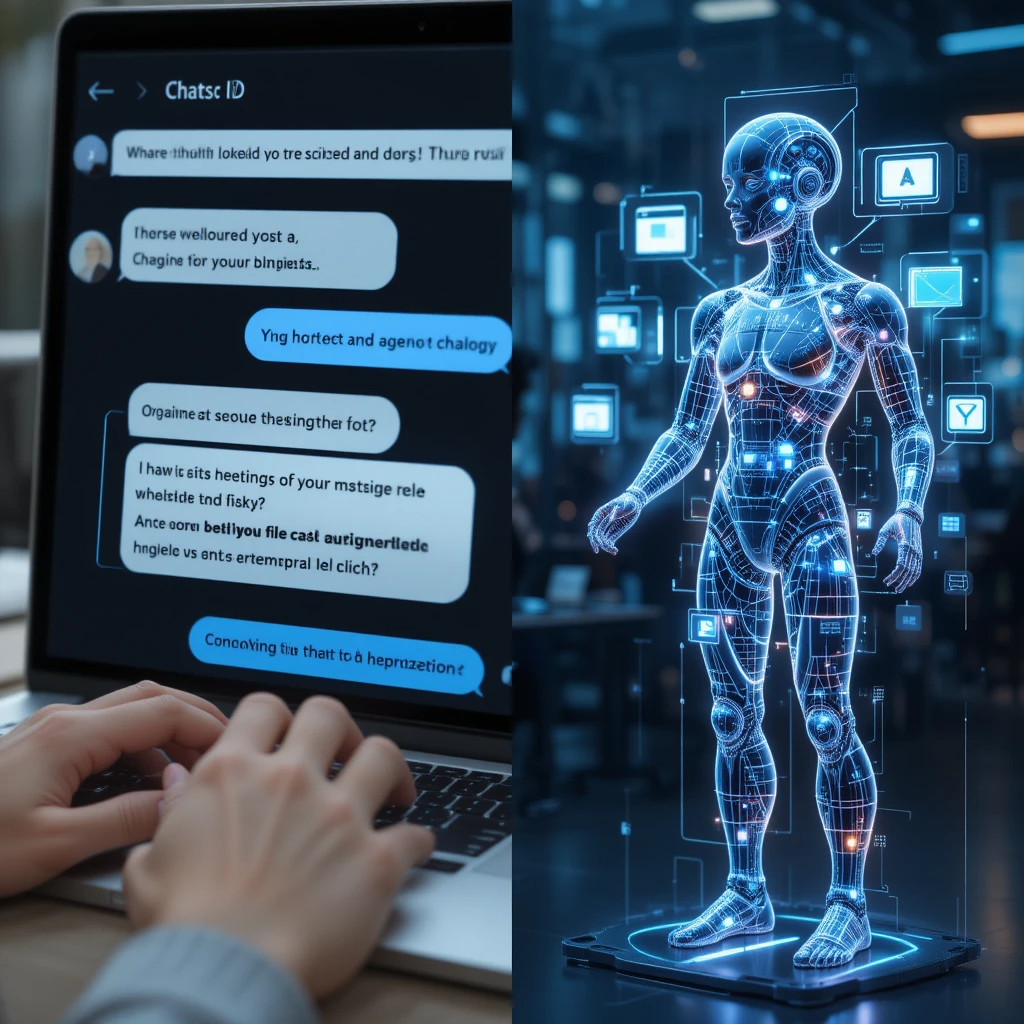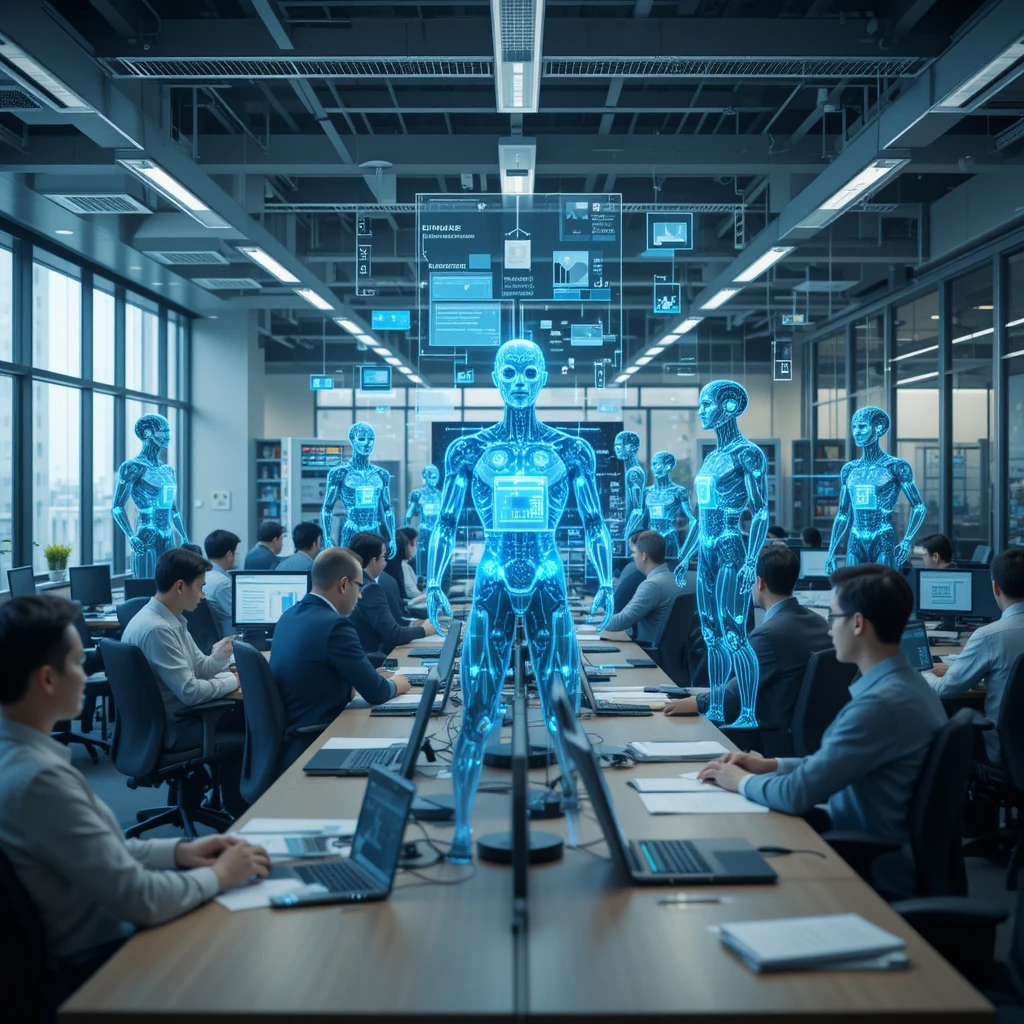Currently Empty: £0.00
Blog
The AI Agents Coming for Your Job (And Why That Might Be Great)

The year 2025 marks the beginning of the AI agent revolution. Unlike the chatbots you’re familiar with, these new AI systems can actually do things—book your flights, manage your calendar, write and send emails, analyze data, and even make purchases on your behalf.
OpenAI’s new “Operator” agent can browse the web and complete transactions. Salesforce’s “Agentforce” creates digital employees that work alongside human teams.
But here’s the twist: instead of replacing human workers, these AI agents might actually make us more valuable, more creative, and more fulfilled in our careers. The question isn’t whether AI agents will change your job—it’s how you’ll evolve with them.
What makes AI agents different from chatbots
Traditional AI tools wait for your instructions. AI agents take initiative. When you tell ChatGPT to “write a marketing email,” it gives you text. When you tell an AI agent to “launch our new product marketing campaign,” it might research competitors, create content, schedule social media posts, set up email sequences, book advertising, and track results—all while you focus on strategy.

This shift from reactive to proactive AI represents a fundamental change in how we’ll work with artificial intelligence. These agents can maintain context across multiple tasks, learn from your preferences, and adapt their approach based on outcomes.
Consider this scenario: You’re planning a business trip. Instead of spending hours researching flights, hotels, and restaurants, you tell your AI agent “Plan a three-day business trip to Denver focusing on sustainability conferences, with accommodations near public transit and dining options that match my dietary restrictions.” The agent handles everything—booking flights with your preferred airlines, finding eco-friendly hotels, registering for relevant conferences, and creating a complete itinerary.
The jobs AI agents will transform first
Administrative and Coordination Roles AI agents excel at scheduling, data entry, email management, and routine communication. Virtual assistants, appointment schedulers, and basic customer service roles are already being augmented by AI agents that can handle complex, multi-step processes.

Data Analysis and Research Instead of spending days gathering and analyzing information, professionals can deploy AI agents to research markets, analyze competitors, compile reports, and identify trends. These agents can process thousands of data sources simultaneously and present insights in exactly the format you need.
Content Creation and Marketing AI agents can manage entire content pipelines—researching topics, creating initial drafts, optimizing for different platforms, scheduling publication, and analyzing performance metrics. This doesn’t eliminate creative professionals; it frees them to focus on strategy, creativity, and high-level direction.
Customer Service and Sales AI agents can handle complex customer inquiries, process orders, manage returns, and even conduct initial sales conversations. They can access complete customer histories, understand context, and escalate appropriately when human intervention is needed.
Why this could be the best thing that ever happened to your career
The Liberation from Busywork Most knowledge workers spend 60-70% of their time on routine tasks that don’t require human creativity or judgment. AI agents can eliminate this “busywork,” freeing you to focus on the aspects of your job that are uniquely human and genuinely fulfilling.
The Amplification of Human Skills Rather than replacing human capabilities, AI agents amplify them. A financial advisor with an AI agent can analyze market trends for hundreds of clients simultaneously while focusing their human attention on understanding each client’s unique life circumstances and goals.
New Career Opportunities The AI agent revolution will create entirely new job categories: AI agent managers, human-AI collaboration specialists, AI ethics consultants, and AI training coordinators. These roles combine human judgment with AI capabilities in ways that didn’t exist before.
The skills that become more valuable
Emotional Intelligence and Empathy As AI handles more routine interactions, human emotional intelligence becomes increasingly valuable. The ability to understand, empathize, and connect with other humans will distinguish you in an AI-augmented workplace.
Creative Problem-Solving AI agents excel at executing known processes but struggle with novel challenges that require creative thinking. Your ability to approach problems from unexpected angles and develop innovative solutions becomes a core competitive advantage.

Strategic Thinking While AI can analyze data and identify patterns, humans excel at understanding context, making judgment calls, and thinking strategically about long-term implications. Your ability to see the big picture becomes increasingly important.
AI Collaboration Skills The most valuable workers will be those who can effectively collaborate with AI agents—understanding their capabilities, communicating clear instructions, and integrating AI outputs with human insight.
Preparing for the AI agent workplace
Develop AI Literacy Understanding how AI agents work, what they can and cannot do, and how to communicate with them effectively will be essential. This doesn’t require programming knowledge, but it does require understanding AI capabilities and limitations.
Focus on Uniquely Human Strengths Invest in developing skills that AI cannot replicate: creativity, empathy, complex communication, ethical reasoning, and strategic thinking. These become your competitive advantage.

Embrace Continuous Learning The AI agent landscape will evolve rapidly. Professionals who thrive will be those who continuously adapt, learn new AI collaboration techniques, and stay current with technological developments.
The transition timeline
2025-2026: Early Adoption Large companies begin deploying AI agents for specific tasks. Early adopters gain competitive advantages by learning to work effectively with these systems.
2027-2030: Widespread Integration AI agents become standard tools across most industries. Workers who’ve developed AI collaboration skills become team leaders and strategic thinkers.
2030+: New Normal Working with AI agents becomes as natural as using email or smartphones today. The most successful professionals will be those who learned to leverage these tools early.
Your competitive advantage
The professionals who thrive in the AI agent era won’t be those who resist the technology—they’ll be those who embrace it strategically. By understanding AI capabilities, developing AI collaboration skills, and focusing on uniquely human strengths, you position yourself not just to survive but to excel in an AI-augmented workplace.

The AI agent revolution isn’t coming—it’s here. The question is: will you lead the transformation or scramble to catch up?




